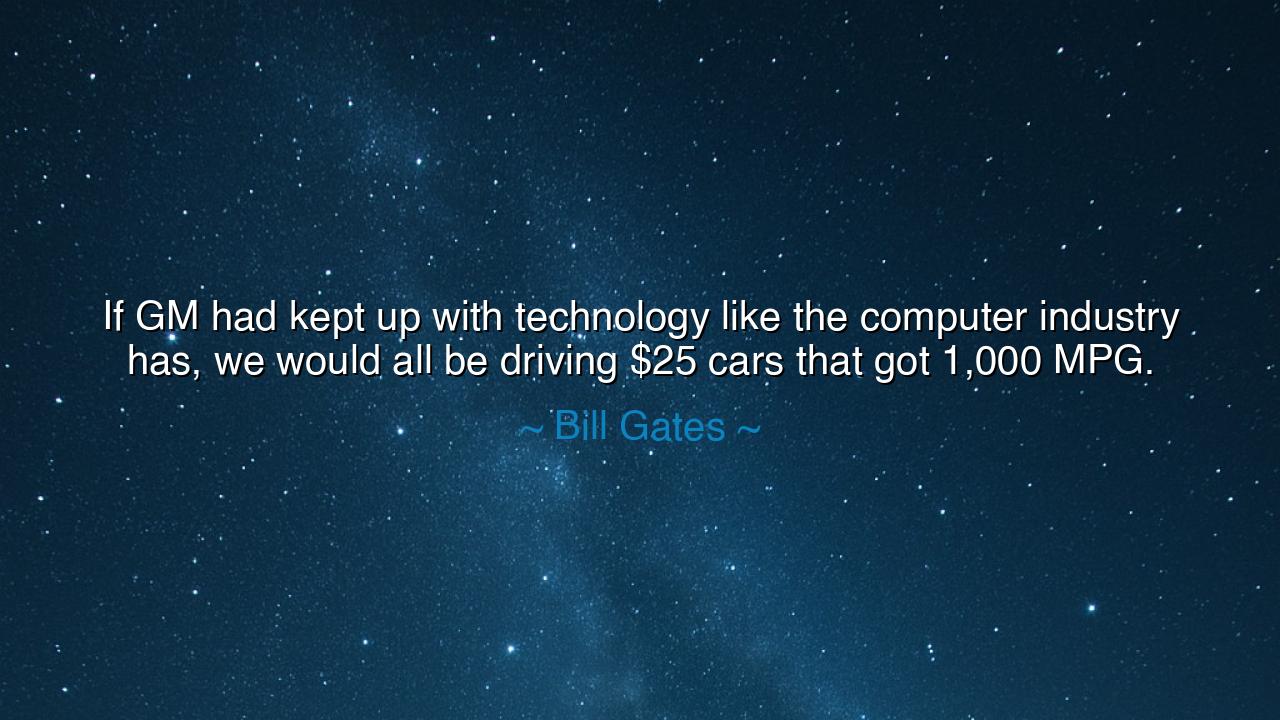
If GM had kept up with technology like the computer industry
If GM had kept up with technology like the computer industry has, we would all be driving $25 cars that got 1,000 MPG.






The words of Bill Gates, architect of the digital revolution, are sharp as a blade and filled with both challenge and vision: “If GM had kept up with technology like the computer industry has, we would all be driving $25 cars that got 1,000 MPG.” In this striking statement, he contrasts the relentless pace of innovation in the world of computing with the slower march of automobiles, calling us to consider what progress might look like if all industries embraced the same spirit of change. It is not merely a jest, but a parable of possibility and potential squandered.
The meaning begins with the recognition that the computer industry has advanced at a staggering rate, following what came to be known as Moore’s Law: the doubling of processing power every two years. This law, born of insight and driven by ambition, pushed engineers to shrink circuits, to make machines faster, cheaper, and more powerful. Gates’ words suggest that if the automobile industry had embraced a similar commitment to progress, cars today would be unimaginably efficient, accessible to all, and revolutionary in their impact. He is urging us to see that the speed of advancement is not limited by what is possible, but often by what is pursued.
The origin of this quip lies in the 1990s, when Gates used this comparison to illustrate how extraordinary the growth of the tech industry had been. By drawing attention to the stagnation of General Motors, he highlighted the complacency that can settle upon industries unwilling to reinvent themselves. His words were not only meant to celebrate computing but also to provoke — to awaken others to the truth that human ingenuity, if harnessed, could reshape entire sectors of life.
History offers parallels that make this lesson clear. Consider the Wright brothers, who defied convention and ushered in the age of flight. In less than a century, aviation advanced from fragile wooden frames to supersonic jets. This was not by chance, but by daring minds who refused stagnation. Contrast this with industries that clung to old ways, unwilling to adapt, and they were left behind, their names now forgotten. Gates, like the prophets of old, warns that those who do not adapt, who do not strive, risk irrelevance in a world that demands growth.
The lesson for us is not only about cars and computers, but about life itself. Every field, every craft, every individual must ask: am I growing, adapting, pressing forward? Or am I clinging to what is familiar, content with mediocrity while the world evolves around me? Gates teaches us that progress comes not from passivity, but from relentless curiosity and courage. The cost of innovation may be high, but the cost of stagnation is far greater.
For the soul seeking to walk wisely, practical actions are clear. Do not be satisfied with “good enough.” Seek out ways to improve, whether in your work, your learning, or your relationships. Embrace technology and change not as threats, but as opportunities to expand what is possible. Demand excellence of yourself and of the systems around you, refusing to settle for less when greatness is within reach.
Thus, let Bill Gates’ words echo not as a simple jest about cars, but as a profound reminder of human potential. If one industry can reinvent the world in a few decades, so too can others — if only they dare. And so it is with our lives: if we embrace the spirit of continual growth, we too can achieve what once seemed impossible, turning limitations into stepping stones, and dreams into enduring realities.






AAdministratorAdministrator
Welcome, honored guests. Please leave a comment, we will respond soon